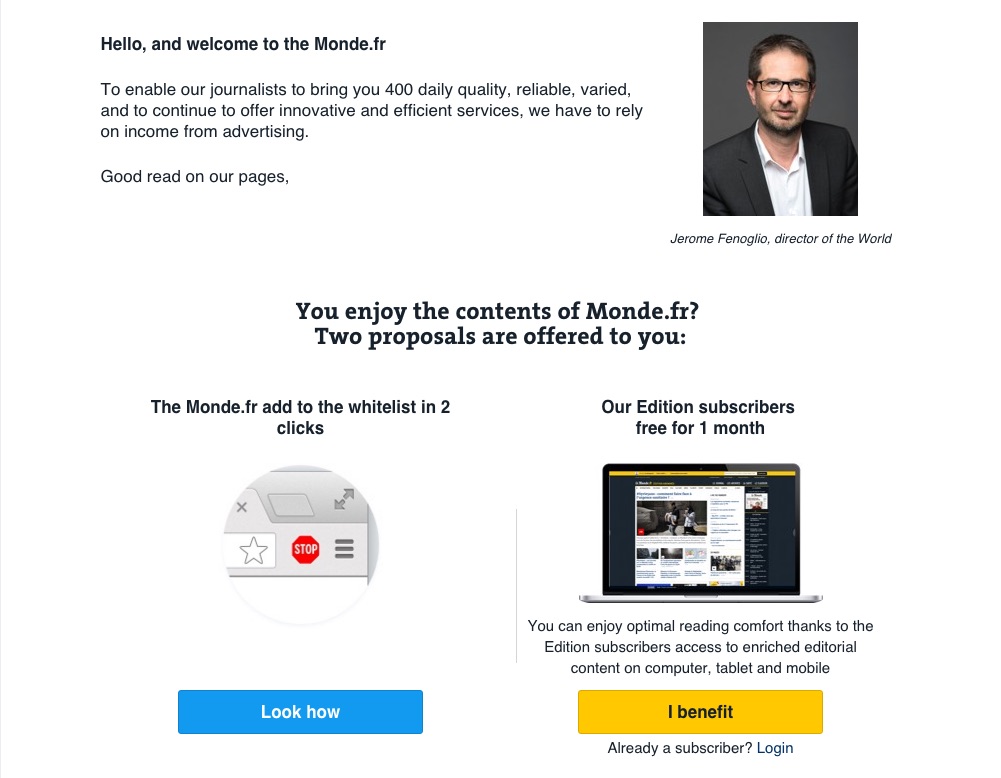Secure your place at the Digiday Media Buying Summit in Nashville, March 2-4

After asking nicely, twice, French publisher Le Monde will get tough with ad-block users, blocking them from content unless they turn off their ad blockers.
“We’ll give a more restrictive message on the second or third page viewed, you can’t read an article without turning off the ad blocker,” said head of analytics at the publisher, Pierre Buffet, adding that another test is highly probably, but the nature of it has not yet been decided. Blocking content will see it take a similar approach to Le Figaro, which has had more success in asking users to disable ad blockers.
French news publishers have collectively fought ad blockers by running two month-long experiments in March and September, with publishing trade body Geste organizing the effort.
Le Monde has found that 20 percent of its users run ad blockers. In September, Le Monde served messages to readers with ad blockers installed asking them to whitelist the site, but it did not block the content. This time, 14 percent of ad-block users put the site on a whitelist, a slight improvement from March when 13 percent did. For its next test, which should run in two months, the gloves are coming off.
Before September, Le Monde detected ad blockers on 27 percent of pageviews. During the operation, it fell to 22 percent. However, it’s anticipating it will climb back up. “We know whoever turns off an ad blocker will turn it back on again,” added Buffet.
In August, Le Monde tested several different messages, one with a picture of editor-in-chief, Jerome Fenoglio and a short explanation on Le Monde’s ad-funded model, which ad-block users saw when they used the site in March. The second had a more in-depth message about how many journalists Le Monde has and the cost of keeping up quality journalism, accompanied by a cartoon about ad blocking. The second version was more efficient in asking people to whitelist the site, so this is what it ran during September.

“I totally understand people who set an ad block on Le Monde,” admits Buffet. “It’s kind of aggressive, not very user-friendly. We know we have too much, but we can’t do without the revenue at the moment.”
Previously, Le Monde decided against a hard ban on viewing content because it was afraid of losing traffic. Even when it plans to block content in the future tests, Le Monde will serve the message only on the second or third page view, so as not to lose too much revenue. But as its findings confirmed, ad-block users visit more frequently and consume twice as many pages than other visitors.
“We’ve been crying about ad blockers, but we still don’t change our ad policy,” said Buffet. “If we don’t make a major change on the website and deal with the route causes we probably won’t win.”
The picture is the same for other French publishers, although some are creating their own user-friendly ad policies. Geste and the IAB in France are in the process of renewing guidelines for more user-friendly ads that will be announced next year.
For now, the ad-blocking problem is affecting Le Monde on desktop only. It has just begun the process of redesigning its mobile site with more of an eye on the user experience. “Right now, we need money, so we need to sell ads no matter what the user thinks, but I hope we won’t make same mistakes.”
Images: Courtesy of Le Monde, via Facebook.
This article was corrected to make clear that another ad block test is highly probably for Le Monde, but the nature of it has not yet been decided.
More in Media

From feeds to streets: How mega influencer Haley Baylee is diversifying beyond platform algorithms
Kalil is partnering with LinkNYC to take her social media content into the real world and the streets of NYC.

‘A brand trip’: How the creator economy showed up at this year’s Super Bowl
Super Bowl 2026 had more on-the-ground brand activations and creator participation than ever, showcasing how it’s become a massive IRL moment for the creator economy.

Media Briefing: Turning scraped content into paid assets — Amazon and Microsoft build AI marketplaces
Amazon plans an AI content marketplace to join Microsoft’s efforts and pay publishers — but it relies on AI com stop scraping for free.





